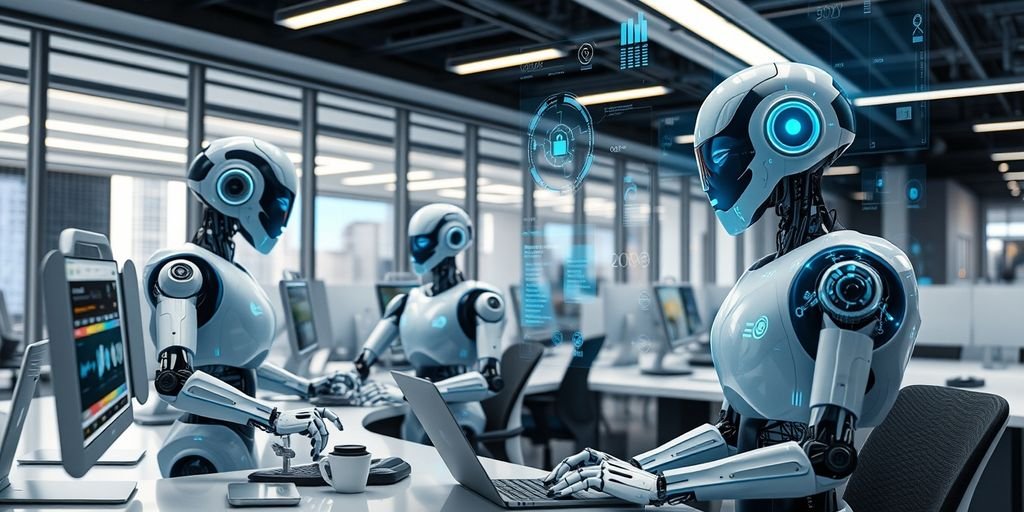Artificial Intelligence (AI) is not just a futuristic concept; it’s a present-day reality that’s reshaping industries at an unprecedented pace. The latest AI-based image recognition tools are a testament to this transformation, offering capabilities that were once considered science fiction. These tools are now pivotal in various sectors, from manufacturing and retail to agriculture, providing insights and efficiencies that are revolutionizing the way businesses operate. This article delves into the impact of these cutting-edge technologies and how they’re forging new paths for industry innovation and productivity.
Key Takeaways
- AI-based image recognition tools are enhancing efficiency and quality control in manufacturing and retail, enabling predictive analytics for supply chain management, and fostering AI-driven business models.
- In agriculture, AI is facilitating precision farming, improving crop yield predictions and management, and contributing to sustainability and environmental impact reduction.
- The integration of AI in various industries is not just streamlining operations but also paving the way for new business opportunities and innovative practices.
Revolutionizing Industry: AI’s Role in Manufacturing and Retail
Enhancing Efficiency and Quality Control with AI
The manufacturing industry is witnessing a significant transformation, thanks to the integration of AI technologies. AI-powered computer vision systems are at the forefront, enabling unprecedented levels of defect detection and quality assurance. These systems analyze images and videos from the production line in real time, identifying anomalies that human inspectors might miss.
One of the most compelling applications of AI in manufacturing is predictive maintenance. By analyzing data from sensors and machinery, AI can predict equipment failures before they occur, minimizing downtime and maintenance costs. This proactive approach to maintenance ensures that production runs smoothly and efficiently, with a marked improvement in overall product quality.
The synergy between AI and manufacturing is not just about enhancing current processes; it’s about reimagining them for a smarter future.
The table below showcases recent advancements in AI applications within the manufacturing sector:
| AI Application | Benefit |
|---|---|
| Predictive Maintenance | Reduces downtime |
| Quality Control | Enhances product quality |
| Production Optimization | Increases efficiency |
As AI continues to evolve, its role in manufacturing is set to deepen, offering new avenues for innovation and service enhancement.
Predictive Analytics and AI in Supply Chain Management
The integration of Artificial Intelligence in Supply Chain Predictive Analytics is a game-changer for industries looking to streamline their operations. By leveraging AI-driven predictive analytics, companies can gain a competitive edge in the market and reduce costs associated with supply chain management. AI-powered tools analyze vast amounts of data to forecast demand, optimize inventory levels, and prevent overproduction or stockouts.
AI applications in the manufacturing industry are being used for quality analysis for achieving production optimization.
One of the most impactful applications is in inventory monitoring and logistics tracking. AI systems can predict when a product will run out and automate reordering processes, ensuring that supply chains are both efficient and resilient. This is particularly crucial in a world where consumer demands are increasingly unpredictable.
Here are some key benefits of AI in supply chain management:
- Enhanced decision-making through data-driven insights
- Improved inventory management with predictive stock levels
- Optimized logistics for timely deliveries and reduced waste
- Increased customer satisfaction by meeting demand without delays
The recent advancements in AI for supply chain management are not just theoretical; they are already being implemented across various sectors, leading to significant improvements in efficiency and cost savings.
The Emergence of AI-Driven Business Models
The integration of AI into various industries has led to the rise of innovative business models that leverage the power of machine learning and data analytics. AI-driven platforms are particularly transformative in the retail sector, where they enable a more personalized and efficient shopping experience. For instance, AI-powered recommendation engines are now a staple in e-commerce, analyzing customer purchase history and browsing behavior to suggest products that are more likely to be of interest to the consumer.
One of the most recent trends is the development of AI-powered industry cloud platforms. These platforms offer tailored solutions that cater to the specific needs of different sectors. In retail, for example, such platforms can integrate seamlessly with existing systems to provide a holistic view of operations, from inventory management to customer engagement.
- AI for on-demand services
- Subscription-based models
- Automation of routine tasks
- Predictive analytics for customer behavior
The potential of AI to revolutionize industry practices is immense, with benefits ranging from operational efficiency to the creation of entirely new services that were previously unimaginable.
AI in Agriculture: Cultivating the Future of Farming
Precision Agriculture: AI for Resource Optimization
The integration of AI in precision agriculture is a game-changer for the farming industry. By leveraging high-resolution imagery from drones and advanced sensors, AI algorithms can create detailed maps of farmlands, pinpointing areas that require attention. This real-time monitoring is crucial for identifying issues such as pest infestations, nutrient deficiencies, or water stress early on, allowing for prompt and precise intervention.
In the realm of water efficiency, AI’s role is particularly significant. With the growing concerns over water scarcity, precision agriculture powered by AI ensures that water resources are utilized optimally. This not only conserves water but also ensures that crops receive the right amount at the right time, enhancing growth and yield.
The use of AI in agriculture is not just about boosting productivity; it’s also about fostering sustainability. By reducing waste and improving resource management, AI is paving the way for a more resilient and environmentally friendly agricultural sector.
Here’s how AI contributes to water efficiency in agriculture:
- Real-time soil moisture monitoring to adjust irrigation schedules.
- Predictive analytics for weather patterns to plan irrigation.
- Automated irrigation systems that deliver precise water quantities.
- Analysis of crop water requirements for different growth stages.
AI-Enhanced Crop Yield Prediction and Management
The integration of AI in agriculture is not just a futuristic concept; it’s a present reality with tangible benefits. By leveraging machine learning (ML) and deep learning (DL) algorithms, the agricultural sector is witnessing a significant transformation in crop yield prediction and management. These technologies are instrumental in analyzing vast amounts of data, including soil quality, weather patterns, and plant health, to provide precise forecasts and actionable insights for farmers.
The predictive capabilities of AI are revolutionizing how farmers approach crop management, allowing for more accurate and timely interventions.
One of the most recent trends in this domain is the comparative study of ML and DL techniques in predicting crop yields. The findings from such studies are critical in determining the most effective algorithms for various agricultural scenarios. For instance:
- ML algorithms may excel in scenarios with structured data and clear patterns.
- DL algorithms could outperform when dealing with unstructured data, such as images from drones or satellites.
The table below illustrates a simplified comparison of ML and DL in crop yield prediction:
| Algorithm Type | Data Handling | Prediction Accuracy |
|---|---|---|
| ML | Structured | High |
| DL | Unstructured | Very High |
The goal is to enhance decision-making, reduce waste, and ultimately, improve the sustainability of farming practices. As AI continues to evolve, the agriculture industry is poised to reap the benefits of these advanced predictive tools.
Sustainability and Environmental Impact Reduction through AI
The integration of AI in agriculture is not just about enhancing productivity; it’s also a critical tool for sustainability and environmental stewardship. Recent trends have seen the development of AI-based applications that are specifically designed to minimize the ecological footprint of farming operations. One such innovation is the use of AI for more precise crop spraying, where cameras trained to recognize weeds ensure that herbicides are applied only where needed, significantly reducing chemical usage.
Moreover, image recognition technologies are now being leveraged to support sustainable farming practices. These tools enable farmers to monitor crop health and soil conditions with unprecedented accuracy, leading to more informed decisions and efficient resource use. The impact of such technologies is profound, promoting precision agriculture that aligns with environmental conservation goals.
The potential of AI to enhance sustainability extends beyond immediate agricultural benefits. It encompasses broader societal impacts, including the reduction of pesticides and fertilizers, improved water management, and a lower carbon footprint for the entire sector. As AI evolves, it is imperative to ensure its development and application are guided by responsible and ethical considerations.
Embracing the AI Revolution in Industry
As we have explored throughout this article, the integration of AI-based image recognition tools is not just a glimpse into the future—it is a transformative reality reshaping industries today. From healthcare to agriculture, transportation to education, the applications are vast and the benefits, substantial. These tools are enhancing efficiency, improving decision-making, and unlocking new possibilities for innovation and growth. As AI continues to evolve, it will undoubtedly present new challenges, but the potential for positive impact on society and the economy is immense. For businesses and industries, the message is clear: the time to adapt and harness the power of AI is now. Those who embrace this technology will be well-positioned to lead in the era of intelligent automation and beyond.
Frequently Asked Questions
How is AI-based image recognition impacting the manufacturing industry?
AI-based image recognition is revolutionizing the manufacturing industry by enhancing efficiency and quality control. It enables real-time monitoring of production lines, defect detection, and predictive maintenance, leading to reduced downtime and improved product quality.
What role does AI play in precision agriculture?
AI plays a crucial role in precision agriculture by optimizing resource use and improving crop management. Through data analysis and pattern recognition, AI tools can provide farmers with actionable insights for better soil health, irrigation scheduling, and disease prevention, leading to increased yields and sustainability.
Can AI help reduce the environmental impact of farming?
Yes, AI can significantly reduce the environmental impact of farming by enabling more precise application of water, fertilizers, and pesticides, which minimizes runoff and waste. Additionally, AI-driven crop monitoring can lead to better land management practices and promote conservation efforts.



